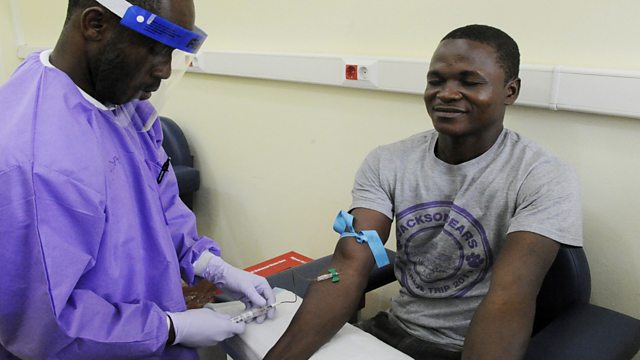Long-term Neurological Problems in Liberian Ebola Survivors
Neurological symptoms in Liberian Ebola survivors; Why the sun is a killer for people with albinism in Tanzania; A huge 42-country study looks at the health of teenagers in Europe
The Ebola crisis in West Africa is over, but for some survivors symptoms continue and the nature of them has surprised researchers: Headaches, memory problems, depression and painful joints all being fairly common. Dr Lauren Bowen, a neurologist from the National Institute of Neurological Disorders and Stroke (NINDS) in Bethesda in the US, is part of a team who are following up survivors of Ebola in Liberia, and she tells Claudia how people are being affected by their neurological problems. This work is part of the larger Prevail III natural history study, from which preliminary findings will be presented at the American Academy of Neurology鈥檚 annual meeting in Canada in April.
Albino skin cancer in Tanzania
In the East African nation of Tanzania, 30,000 people have albinism - a congenital condition in which the skin lacks pigment - and live in fear. In a country where belief in witchcraft runs strong, they are considered as cursed beings, or ghosts, and singled out for ritual killings. But their biggest, silent killer is the sun, with soaring skin cancer rates and a lack of affordable, suitable sun cream to protect their skin. As a result 90% of people with albinism do not live beyond the age of 30. But as Hannah McNeish reports, a new product manufactured by a dermatology centre in northern Tanzania is now trying to save the lives of people with albinism across the country, and hopefully throughout the continent.
European adolescent health
A sixth of the world's population are teenagers and this period of adolescence is a time when behaviours such as smoking or drinking - which can have a lifelong impact on health - often begin. For 30 years the World Health Organisation has been collecting data from dozens of countries to look at trends over time. The latest results for Europe have just been published and there is big variation between different countries. The good news is that smoking and alcohol consumption have gone down, but the health and well-being of young people is being challenged by stark social inequalities and there are marked differences between boys and girls. Lead editor Dr Joanna Inchley is deputy director of the Child and Adolescent Health Research Unit at St Andrews University in Scotland, which co-ordinated the study
Photo: An Ebola survivor who volunteered to participate in a study in Monrovia. to unravel the mystery of the long-term health effects that plague Ebola survivors, Credit: ZOOM DOSSO/AFP/Getty Images
Last on
Broadcasts
- Wed 16 Mar 2016 20:32GMT麻豆社 World Service Online, Americas and the Caribbean, UK DAB/Freeview & Europe and the Middle East only
- Wed 16 Mar 2016 21:32GMT麻豆社 World Service East Asia, Australasia, South Asia & West and Central Africa only
- Thu 17 Mar 2016 02:32GMT麻豆社 World Service Americas and the Caribbean
- Thu 17 Mar 2016 03:32GMT麻豆社 World Service Online, Europe and the Middle East, East Asia & UK DAB/Freeview only
- Thu 17 Mar 2016 04:32GMT麻豆社 World Service South Asia
- Thu 17 Mar 2016 05:32GMT麻豆社 World Service Australasia
- Thu 17 Mar 2016 07:32GMT麻豆社 World Service East and Southern Africa & Europe and the Middle East only
- Thu 17 Mar 2016 13:32GMT麻豆社 World Service Online & UK DAB/Freeview only
- Thu 17 Mar 2016 14:32GMT麻豆社 World Service East and Southern Africa, East Asia, West and Central Africa, South Asia & Europe and the Middle East only
Podcast
-
![]()
Health Check
Health issues and medical breakthroughs from around the world.


